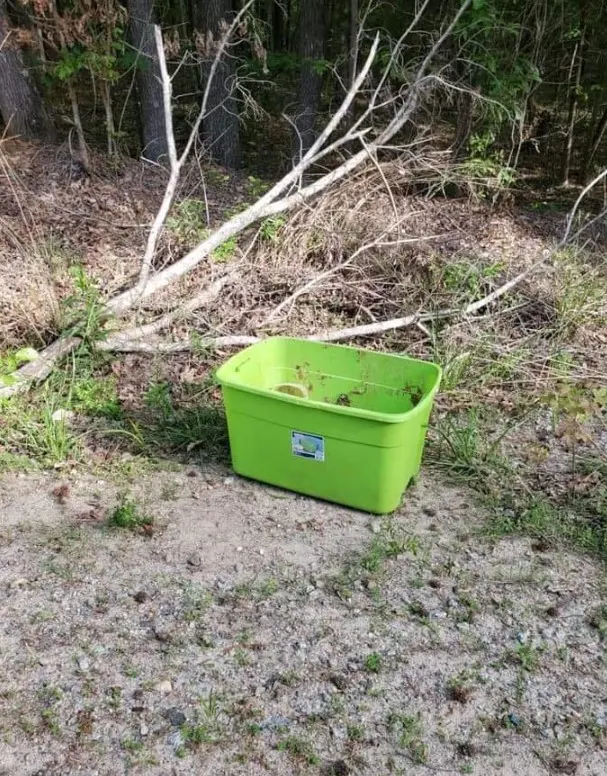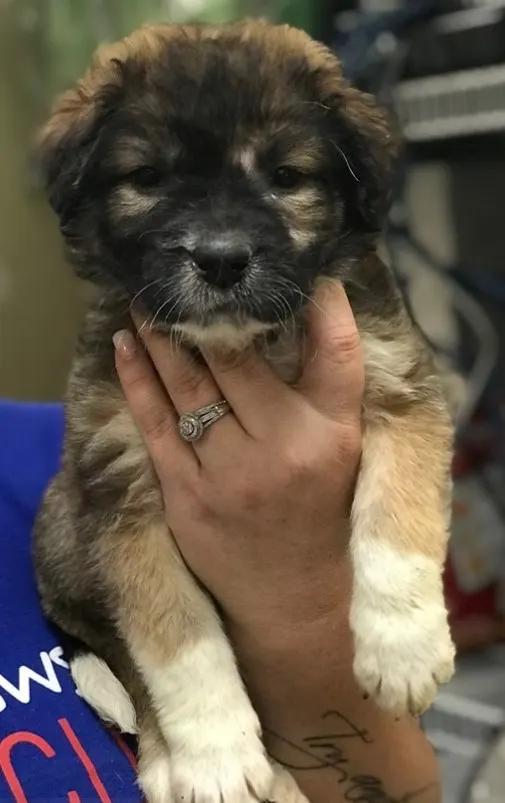When people think of getting rid of their puppies, the most common method is usually to surrender them to a shelter so they are no longer their problem.
However, it isn’t always so simple. Sometimes, shelters are overcrowded, and people left without options or patience will cruelly dump the puppies on the street and leave them to survive on their own until someone finds them.
In this story, we will talk about tiny puppies who were just left in the middle of nowhere, with no way to survive on their own.
What’s In The Box

It was a very hot day when one of the residents from Anson County, North Carolina, came across a green box at the edge of the woods.
The Good Samaritan got closer and saw that there were five small puppies trapped in the box.
Somebody had just left them there, and the worst part of all is that it was incredibly hot outside, which meant that the pups wouldn’t have had a lot of time unless someone found them.

They were too small and fragile to climb out of it themselves, so they needed help. Luckily, for them, the Good Samaritan took a crate, got all of the puppies in it, and gave them some food and water.
After he made sure that they regained some of their strength, he decided to look for help.
A Brand New Chapter For The Pups

The next step was to transfer them to the Rescue Dogs Rock NYC vet partner in North Carolina.
Jackie O’Sullivan told The Dodo: They were weak and dehydrated and apparently had a funny smell. One was not doing well so we feared parvo, but after some fluids, baths and good nutrition, so far all five are doing OK.
At the vet, they determined that the puppies were around 6 weeks old, and they named them: Sullivan, Snoopy, Sanders, Simon, and Sassafrass.
They received a full checkup, vaccinations, and fluids, and underwent a deworming procedure. After some time had passed, they had started recovering well.

O’Sullivan said: They are lucky they were found in time.
After recovery, they were sent to foster care where they waited for adoption. While it’s unclear if they were adopted, I am fairly certain that somebody has stepped in by now and taken the puppies to their forever home.
If you’ve ever noticed your furry friend having tummy troubles, you know how concerning it can be. When your dog is experiencing diarrhea, it can be a messy situation for both of you. As a seasoned dog trainer, I’ve encountered this issue countless times, and I understand the worry it can cause.
Seeing your pup uncomfortable and dealing with digestive issues can be distressing. There are various reasons why your dog might be having diarrhea, ranging from dietary indiscretions to underlying health issues. Understanding the potential causes can help you address the problem effectively and ensure your four-legged companion gets back to their happy, tail-wagging self in no time.
Understanding Canine Diarrhea
Common Causes of Diarrhea in Dogs
When your furry companion is dealing with diarrhea, it can be a worrying time for both of you. The common causes of diarrhea in dogs may vary, ranging from dietary changes, such as eating something unusual, to more serious issues like infections or underlying health conditions. It’s essential to consider recent changes in your dog’s diet or environment as potential triggers for this distressing symptom.
Recognizing the Symptoms
Recognizing the symptoms of diarrhea in your dog is crucial for prompt intervention and treatment. Keep an eye out for signs such as increased frequency of bowel movements, loose or watery stools, blood in the stool, lethargy, vomiting, or a sudden change in behavior. If your dog exhibits these symptoms, it’s advisable to consult your veterinarian for a proper diagnosis and appropriate management to help your furry friend get back to their happy, healthy self.
Dietary Issues Leading to Diarrhea
Food Intolerance and Allergies
If your dog is experiencing diarrhea, food intolerance or allergies could be the culprits. Just like humans, dogs can have sensitivities to certain ingredients in their food. These sensitivities can lead to digestive issues like diarrhea. Common allergens for dogs include beef, chicken, dairy, and grains. If your dog has been recently introduced to a new type of food and is now experiencing diarrhea, it might be due to a food allergy or intolerance.
Dietary Indiscretions and Its Effects
Dogs are notorious for getting into things they shouldn’t eat. Garbage, human food, or even certain plants can cause gastrointestinal upset, leading to diarrhea. If your furry friend has a habit of scavenging for food or has recently consumed something unusual, it could be the reason behind their upset stomach. Keep an eye on your dog’s eating habits and surroundings to prevent dietary indiscretions that may result in diarrhea.
Health Conditions That Cause Diarrhea
Parasitic Infections in Dogs
Parasites like giardia, roundworms, and hookworms can wreak havoc on your dog’s digestive system, leading to diarrhea. These microscopic troublemakers are often picked up from contaminated soil or water sources. Symptoms may include loose stools, vomiting, and weight loss. Regular deworming and preventive measures can help keep these parasites at bay.
Viral and Bacterial Infections
Viruses such as parvovirus and bacteria like salmonella are notorious for causing diarrhea in dogs. These infections are highly contagious and can spread quickly, especially in environments with multiple dogs. Symptoms often include bloody diarrhea, dehydration, and lethargy. Prompt veterinary attention, isolation, and proper hygiene practices are crucial in managing and preventing the spread of these infections.
Chronic Illnesses and Diarrhea
Chronic conditions like inflammatory bowel disease (IBD), pancreatitis, and kidney disease can also result in chronic or recurrent diarrhea in dogs. These illnesses require long-term management and often necessitate special diets and medications. Recognizing the signs early, such as frequent diarrhea episodes, weight loss, and changes in appetite, allows for timely intervention and tailored treatment plans. Regular monitoring and check-ups are essential to ensure your furry companion’s well-being.
When to Visit the Vet
Red Flags in Canine Diarrhea
If your dog is experiencing diarrhea and you notice any of the following signs, it’s time to schedule a visit to the vet:
- Blood in the stool: Seeing blood in your dog’s stool can be alarming and indicates a potential serious issue.
- Vomiting: If your dog is vomiting along with having diarrhea, it could be a sign of a more severe underlying problem.
- Lethargy: A lack of energy or enthusiasm in your dog, coupled with diarrhea, may signify a health issue.
- Loss of appetite: If your dog is not interested in food or treats, it could be a cause for concern.
- Frequent diarrhea: Persistent or recurrent diarrhea that doesn’t improve with home care requires professional attention.
What to Expect During the Vet Visit
During your vet visit for your dog’s diarrhea, the vet will likely:
- Perform a physical examination: The vet will check your dog’s overall health and may feel their abdomen for any abnormalities.
- Ask about symptoms: Be prepared to discuss your dog’s symptoms, including when they started and any changes you’ve observed.
- Collect a stool sample: To check for parasites or infections, the vet may ask for a stool sample.
- Recommend tests: Based on the symptoms and physical exam, the vet may suggest additional tests like blood work or imaging.
- Propose treatment: Your vet will recommend a treatment plan tailored to your dog’s specific condition, which may include medications, dietary changes, or other interventions.
Remember, early detection and proper treatment are essential for your dog’s health and well-being, so don’t hesitate to seek veterinary care if you have concerns about your furry friend’s diarrhea symptoms.
Treatment Options for Diarrhea
At-Home Remedies and Care
When your dog has diarrhea, you can try a few at-home remedies to help ease their discomfort. Ensure your dog has access to plenty of water to prevent dehydration. You can also offer a bland diet such as boiled rice and chicken, which is gentle on their stomach. Additionally, probiotics can aid in restoring the balance of good bacteria in your dog’s gut. Monitoring your dog closely and providing a comfortable, quiet space can also help in their recovery.
Medications and Professional Treatments
If your dog’s diarrhea persists or worsens, it’s essential to consult a veterinarian for proper diagnosis and treatment. Your vet may prescribe medication such as anti-diarrheals or antibiotics depending on the underlying cause of the diarrhea. In severe cases, your dog may require intravenous fluids to prevent dehydration. Diagnostic tests like blood work or fecal exams may also be necessary to identify the root cause of the issue. Follow your vet’s recommendations closely to ensure your dog receives the appropriate care and treatments for a speedy recovery.
Prevention and Management
Benefits of a Well-Balanced Diet
Ensuring that your furry friend gets a well-balanced diet is key to preventing diarrhea. A diet rich in high-quality proteins, fibers, and essential nutrients can help maintain your dog’s digestive health. It’s important to choose dog food that suits your pet’s age, breed, and any specific dietary needs they may have. Always consult your vet for guidance on the best diet for your pup.
Importance of Regular Vet Check-Ups
Regular vet check-ups play a crucial role in managing and preventing diarrhea in your dog. These visits help catch any underlying health issues early on, allowing for timely intervention. Your vet can provide tailored advice on your dog’s specific needs, including dietary adjustments, preventive measures, and appropriate treatments. By staying proactive with regular check-ups, you can ensure your dog’s overall well-being and digestive health.
Conclusion
So, if your furry friend is having diarrhea, remember to keep an eye out for any concerning symptoms like blood in the stool or persistent diarrhea. It’s crucial to seek veterinary care promptly to identify the root cause and get the right treatment. Whether it’s a simple dietary adjustment or a more complex medical issue, your vet can guide you on the best course of action. By maintaining a balanced diet and staying proactive with regular vet check-ups, you can help keep your dog’s digestive health in check. Remember, your pup’s well-being is a top priority, so don’t hesitate to reach out to your vet for support and guidance whenever needed.
Frequently Asked Questions
What are the common causes of canine diarrhea?
Canine diarrhea can be caused by various factors, including food intolerance, allergies, dietary indiscretions, parasitic infections, and underlying health conditions.
When should I take my dog to the vet for diarrhea?
You should visit the vet if your dog’s diarrhea is accompanied by blood in the stool, vomiting, lethargy, loss of appetite, or persistent diarrhea that lasts more than a day or two.
What can I expect during a vet visit for my dog’s diarrhea?
During a vet visit for diarrhea, expect a physical examination, discussion of symptoms, stool sample collection, recommended tests, and a personalized treatment plan.
What treatment options are available for canine diarrhea?
Treatment options for diarrhea include at-home remedies like a bland diet and probiotics, as well as professional care with medications, diagnostic tests, and possible intravenous fluids.
[no_toc]

Hey there, I’m Janet Brooks, a dog-loving student from California. I’m all about helping pups in need, especially those without homes. Me and my awesome friends work together to give shelter and love to stray dogs. Oh, and I also write blogs about dogs to share helpful info.